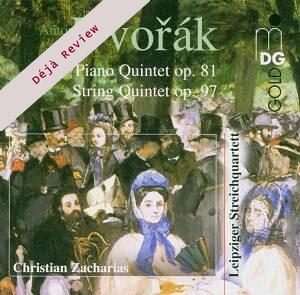Déjà Review: This review was first published in June 2004 and the recording is still available.

Antonín Dvořák (1841-1904)
Piano Quintet, op. 81 A major (1887)
String Quintet for two violins, two violas and cello, op. 97 E flat-major (1893)
Christian Zacharias (piano)
Hartmut Rohde (viola)
Leipzig String Quartet
rec. 2003, Markkleeberg; Furstliche Reitbahn, Bad Arolsen, Germany
MDG 307 1249-2 [73]
It was during the mid-1880s, surely assisted by the tide of nationalism that swept over eastern Europe, that the Bohemian-born composer Antonín Dvořák made his international breakthrough, quickly progressing to phenomenal success. Dvořák began to receive one compositional commission after another and various prestigious academic awards. Numerous offers of tours and conducting obligations took him five times to England alone, within the space of three years. There he soon became esteemed as one of the foremost composers of his time.
In 1887 Dvořák took a break from this hectic period and turned to calmer and diverse pursuits. Outside music Dvořák had many hobbies. He was often seen at railway stations train-spotting and he enjoyed bird-watching particularly at his summer house in Prague. This very industrious musician found rest and relaxation in the chamber music he loved so well. He remarked, “I have so much in my old suitcase that lies slumbering and wants to see the light”. It was thus that he wrote at the time to a friend, referring to the Piano Quintet in A major op. 81, which, within a short space of time, achieved tremendous success in the world’s salons and chamber-music halls.
The substantial and joyous Piano Quintet op. 81 completed in 1887 is composed in the Slavic idiom that pervades so many of Dvořák’s best works written before his extended stay in the United States of America. The Leipzig String Quartet with pianist Christian Zacharias demonstrate their full measure of the score, so overflowing with vivid harmonic colouring, vital dance rhythms and sensual and emotionally rich melodies together with brisk contrasts of mood of Bohemian folk music. The assured and committed performance of the players makes the music all the more magnetic. The impassioned spontaneity of eminent pianist Christian Zacharias is particularly impressive.
Dvořák’s much admired String Quintet op. 97 in E flat-major from 1893 was composed during an extended holiday in the United States visiting the Bohemian colony at Spillville, Iowa. There he reinforced his attraction to the culture of country and was inspired by the folk-songs of the American Negroes and the authentic ritual music of the Iroquois Indians that he met. Dvořák stated that he did not quote directly from actual Native American folk material in the String Quintet op. 97. “I have simply written original themes embodying the peculiarities of the Indian music and, using these themes as subjects, have developed them with all the resources of modern rhythm, harmony, counterpoint, and orchestral colour.” The strings of the Leipzig String Quartet and violist Hartmut Rohde command a beautiful singing tone and phrases throughout and certainly get to the heart of the character of the score. Biographer Otakar Sourek described the third movement Larghetto as “one of the most exotic of Dvořák’s American creations.” I just love the ensemble’s stylish interpretation of the Larghetto which is passionate, spontaneous and exemplary in execution.
The sleeve-notes are interesting and informative but not always easy to understand. However the engineers have provided excellent sound quality. These are hugely impressive performances from first note to last. The experienced Leipzig String Quartet are one of Europe’s best ensembles and I have obtained hours of pleasure from their interpretations. This release from MDG Gold deserves the highest praise.
Michael Cookson
Help us financially by purchasing from





















